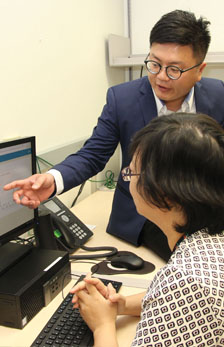Rehabilitation and Participation Science
Program in Occupational Therapy
 Alex Wong, PhD, DPhil, BSOT, sits surrounded by a computer, a laptop, his smartwatch and his smartphone. At set times during the day, his phone pings a reminder for him to open an app and complete a quick assessment of his own physical and psychosocial health.
Alex Wong, PhD, DPhil, BSOT, sits surrounded by a computer, a laptop, his smartwatch and his smartphone. At set times during the day, his phone pings a reminder for him to open an app and complete a quick assessment of his own physical and psychosocial health.
“Technology like this is everywhere,” he points out. “I thought, why not figure out a way to use it to simply and easily optimize rehabilitation outcomes?”
Wong, an occupational therapist and rehabilitation researcher, is an assistant professor of Occupational Therapy and Neurology at Washington University School of Medicine and head of the Connected Health and Innovative Rehabilitation (CHAIR) Laboratory in the Program in Occupational Therapy. He has pondered how to effectively track rehabilitative progress, specifically in neurological patients, for years.
“We track recovery very effectively while a patient is in the hospital or a rehabilitation facility,” he stresses. “The problem is that recovery can progress as long as a year after discharge, so I want to better track a patient’s progress and identify when new or additional interventions can optimize long-term rehabilitation outcomes.”
Enter a new app called Status/Post. Initially created by Chris Mettis, MD, a former pathology resident at Washington University, and now customized with a digital assessment tool co-developed by Wong and Mettis, the app is in pilot studies to test its effectiveness in benchmarking neurological recovery over the long term in terms of physical well-being and psychosocial health.
Wong calls the app both an Ecological Momentary Assessment (EMA) and an Ecological Momentary Intervention (EMI) tool. He believes its mobile health assessment capability is directly in line with what National Institutes of Health Director Francis Collins, MD, PhD, and William T. Riley, director of the NIH Office of Behavioral and Social Sciences Research, stated is the NIH’s strategic, transformative goal—the development of digital intervention platforms that will ultimately transform measurement science in the behavioral and social sciences.
Wong already has early data in his initial study to believe that the app will work well—and enable him and his colleagues to better define what “successful recovery” means and when interventions can actually improve outcomes. He is starting his app testing with patients from Barnes-Jewish Hospital who have been diagnosed with mild or moderate stroke without any major physical or cognitive deficits.
Clinicians already know that recovery after a neurological incident such as a traumatic brain injury or stroke can take as long as a year. Patients, however, typically are discharged from hospitals within 30 days due to insurance requirements. Beyond follow-up clinic or therapy visits, there is no simple way to monitor patients frequently throughout their recovery period to determine whether interventions are warranted to keep them progressing forward.
Monitoring is critical, says Wong, because executive function, motivation and mental health are major drivers of a patient’s desire to engage in community and social activities. Patients with low executive function have severe mood swings throughout the day, which ultimately may trigger social disengagement and depression as well as negatively impact their recovery.
With Status/Post, Wong has devised a digital assessment tool that can easily gather information about medical and psychosocial issues several times each day.
“The app alerts patients three to five times a day to answer a series of quick questions,” he explains as he shows off the app on his own phone. “It prompts patients to answer in real time, while patients are in their real environments and while they can accurately input answers without the fear of memory decline between physician visits.”
The study is still in its infancy, but Wong says he’s surprised that even the small data collected already have found that if a patient can keep their mood stable, it has a positive effect on the patient’s participation in outdoor and out-of-home activities.
“Mobile health research is a new area in rehabilitation science, and it has a high potential to reach thousands or millions of people through the use of a ubiquitous device like a cell phone,” Wong says.
He adds, “I believe we have created a new digital platform that, perhaps within the next 10 years, could be used to capture recovery data and influence rehabilitation interventions worldwide.”
We welcome inquiries from prospective students, potential collaborators, community partners, alumni and others who want to connect with us. Please complete the form below to begin the conversation.
Schedule an Info Session
We are excited that you are considering applying to the Program in Occupational Therapy at Washington University. Please join us for a Zoom Information Session for either our entry-level MSOT or OTD degrees or our online Post-Professional OTD. Current faculty members will discuss the degree program and answer any question you may have. We are offering these sessions on the following days and times. The content is the same for each one, so you only need to sign up for one.
Upcoming ENTRY-LEVEL Degree ZOOM Info sessions:
Schedule an Entry-Level Info Session
Upcoming PP-OTD Degree ZOOM Info session: